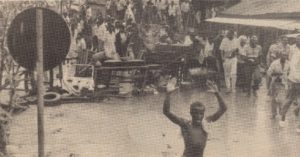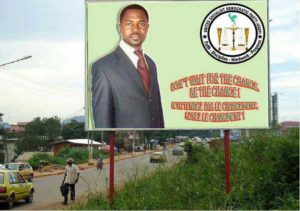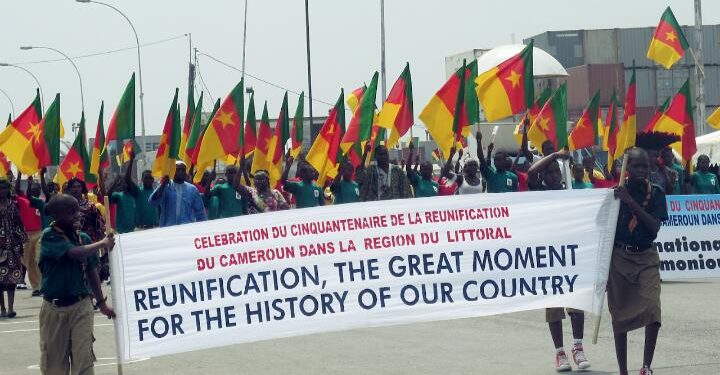In May 1990, Cameroon’s first opposition party, the Social Democratic Front (SDF), was launched in the anglophone city of Bamenda amidst tight security. Six young people were shot in cold blood by state security forces at this historic event, although the official media reported that the victims were trampled upon by the massive crowd that had turned out to witness the launched.
The fact that six young people were martyred for the seed of ‘democracy’ to be sown, became symbolic of the fresh hope for a promising Cameroon, reminiscent of the 1960s when the euphoria of independence and liberation provided optimism to many. The launch of the first opposition party(after re-introduction of Multi party politics) set the ball rolling, particularly as additional civil society activists and opponents of the authoritarian state became even more emboldened in the struggle for the reconfiguration of the state.
Thus, the early 1990s in Cameroon, like in other parts of Africa, marked a turning point in the socio-political life of the country, evidenced by the collapse of the one-party state and the reintroduction of political pluralism. This period also witnessed what some have described as the dramatic eruption of young people into the public sphere, apparent in young peoples’ growing participation in party politics, strike campaigns and other civil society activities.

Image Source: Dibussi.com
Indeed, this era saw the expansion of youth involvement in public affairs beyond the religious and cultural domains, although the euphoria provoked by this new-found liberation soon gave way to disaffection, partly due to the slow pace of democratisation and young peoples’ exclusion from formal socio-political processes.
The analysis of political transition in Cameroon has often neglected the roles of young people and women during this process and the hope for the future that they carry.
Cue in USDP: Union Socialist Democratic Party, which was legalised in September 2011. Prince Michael Ngwese Ekosso, holder of a BA in Social Sciences and International Relations, chairs the United Socialist Democratic Party (USDP).
If you were born after the year 1982 in Cameroon, you will have only ever known one president your entire life. Young people make up a significant part of the country’s population.
Prince Ekosso, says he has what it takes to be the country’s next leader: “80% of the population of Cameroon is made up of youths, and all of them have been praying and waiting for change. So, I can honestly and confidently tell you that we already have 80% of the potential electorate both home and abroad.”
He frowns at the system of “suppression and oppression” under the country’s long-standing leadership: “We will harmonise the constitution and limit presidential mandates in Cameroon from 7 years to 5 years with 2 terms maximum.”
The wannabe president says his regime will be all about creating better opportunities for Cameroonians and luring those abroad to return home: “We will address the social problems of flood, poor housing conditions, low salaries, a corrupt taxation system, poor medical attention for our population, mismanagement of state budget, poor and very slow governance functioning; a system that does not take into consideration the pension benefits of those who have given their sweat and blood to serve the nation.
The denial of double nationality law for some of our Cameroonians in the diaspora who have taken up other nationalities, but have the financial, intellectual, educational and technical skills to fix most of our problems, indicates that Cameroon needs change.”

Image source: Precious Core
“Note that there are many Cameroonian medical experts, engineers and all works of life out there. We will bring them back to assist in treating our population from medical conditions such as the COVID-19 pandemic and other infrastructural, developmental and economic structures which can be easily handled.”
He aims to motivate the youths to participate actively in the political life of their nation. He has also created a fundraiser where supporters can contribute financially to boost his vision of change in Cameroon.
The grand official launching of political activities for the year 2020 of the USDP will take place sometime this year which will be communicated to the press. This comes after taking part in 2018 Presidential Elections, Major National Dialogue and merely observing the latest Municipal and Parliamentary Elections.
The Historical Context
Youths now more and more participate in political parties and many have got to elective decision-making positions.
Hon. Nforme John Tata, one of the first Cameroon National Union (CNU) Members of Parliament for Bui Division in the North West Region, who later served his last term in the National Assembly from 1992 to 1997 on the Cameroon People’s Democratic Movement (CPDM) ticket, once told students in Oku that he went to the National Assembly in 1963 at the age of 23 years.
In fact, following political liberalisation in 1990, several associations and pressure groups were created or reactivated by anglophone elites to represent and defend their interests.
Some, notably the Free West Cameroon Movement (FWCM) and the Ambazonia Movement (AM) of Fon Gorji Dinka, advanced outright secession, but most initially championed a return to the federal state.
Youths across the world have always played an active, positive and effective role in societal transformation. They have played vital roles in fostering democratic transitions and spearheading movements.
But in terms of political parties, there have been the National Democratic Party of Henry Fossung, the Liberal Democratic Alliance of Mola Njoh Litumbe, the Conservative Republican Party, the Social Democratic Front by Ni John Fru Ndi, just to name a few.
Despite these achievements, political leaders have always relegated young people to the background of society when it comes to nation building. Youths have been excluded from the decision-making arena and forced to accept outcomes and decisions without raising their voices.
By Elume Raymond (Guest Writer)
Click here to continue reading









Comments 1